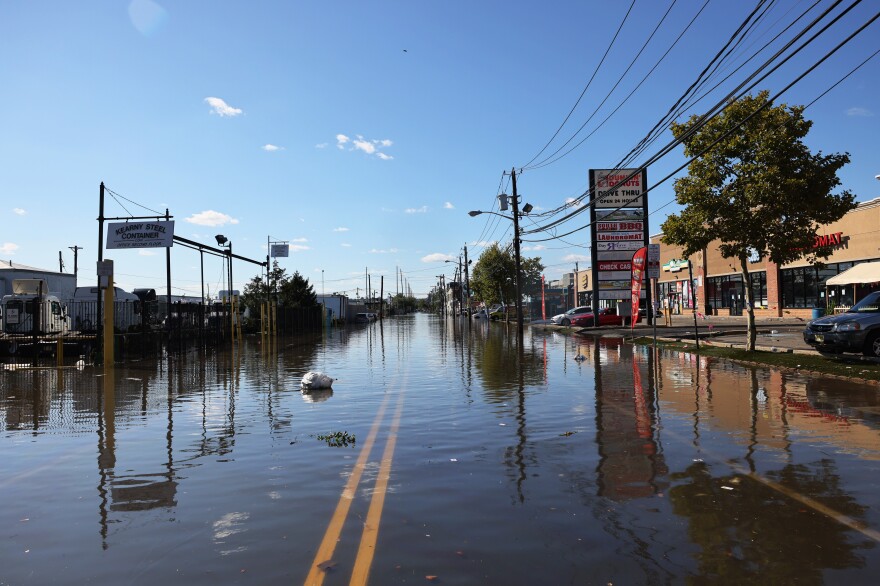Updated September 4, 2021 at 1:32 PM ET
President Biden plans to visit New York and New Jersey on Tuesday to survey the damage wrought when remnants of Hurricane Ida struck several states in the Northeast with ferocity this week, thrashing the region several days after making landfall on the Gulf Coast.
At least 49 people are confirmed dead, and in some areas, the search continues for missing people. Recovery efforts remain underway.
There was "just the right mix of weather conditions" in place for Ida to unleash devastating floods and even tornadoes on parts of the region, Tripti Bhattacharya, an assistant professor of earth and environmental sciences at Syracuse University, told NPR. Scientists say climate change is creating the conditions to make such storms more intense.
It may take some time to rebound from the storm.
"I don't think that I'll ever want to drive again in the rain, to be completely honest," said Diana Silverman of Flushing, Queens, in New York City.
Silverman lost her car to the storm. After she climbed out the driver's side window of it to escape, her car floated away.

She says she was able to shelter in a nearby home with other stranded people, and her friends later helped her find a new car.
"It was kind of nice in a way to see that people still just kind of come together when something like that happens," Silverman said.
Some were trapped in flooded basement apartments
As residents across the area dig out from the wreckage left by extreme weather, many are asking whether the Northeast is prepared for the next big storm and whether they will be safe during a future round of flooding and extreme weather like what the city saw this week.
Many of the New Yorkers who died during the storm were trapped in flooded basement apartments.
Annetta Seecharran, of the Chhaya Community Development Corporation in Queens, says the city needs to make it easier for landlords to make their basement apartments safer.
"It is absolutely urgent, and I think the storm has proven that we need to address this issue and we need to address it now," Seecharran said. "Another storm could come next week. Are we going to risk more lives?"
New York City officials say they're going to try to evacuate residents into emergency shelters before the next storm. They also say they may impose travel bans ahead of future weather events, so drivers don't get stranded in floodwaters.
Biden will visit New Jersey and New York
The president plans to travel to Manville, N.J., and Queens, N.Y., on Tuesday to survey the storm damage, the White House said Saturday. He made a similar visit to the Gulf Coast on Friday.
Federal disaster declarations are in effect for all of New Jersey and parts of New York.

In New Jersey, where some of the worst flash flooding occurred, 25 people were confirmed dead and at least six others remained missing as of Friday.
"Our thoughts and prayers are with every family and community mourning a loved one," New Jersey Gov. Phil Murphy said in a statement.
Murphy declared a state of emergency in response to Ida, and the state was making available $10 million in relief funds for small businesses impacted by the storm.
Some 7,900 utility customers in New York remained without power as of Friday, officials said.
Gov. Kathy Hochul said up to $5 million in federal funds were available immediately to the 14 counties covered by the federal emergency declaration.
"We are committed to providing all the necessary resources for New Yorkers to recover from the historic, devastating flooding, and I have directed all State agencies on the ground to continue to help these impacted areas with cleanup missions," Hochul said in a statement.
Gas supplies are low in Louisiana
It isn't just the Northeast that continues to recover from Ida. The Gulf Coast, which was hit earlier in the week, is still rebounding, too.
Power is coming back on in some New Orleans neighborhoods, but parts of Louisiana slammed hardest by Hurricane Ida could go weeks without electricity.

Officials now say the supply of gasoline is critically low, leaving some to scramble to find open gas stations, often driving three hours round trip to fill up their cars and get supplies for their electric generators.
"We got hit with a double whammy. We got hit at our refineries, eight refineries that represent two-thirds of the refinery capability for Louisiana and 13% of the refining capabilities for the United States," said Cynthia Lee Sheng, president of Jefferson Parish.
Biden, who visited storm-ravaged communities in Louisiana this week, has ordered officials to tap the Strategic Petroleum Reserve to help reduce fuel shortages.
Copyright 2021 NPR. To see more, visit https://www.npr.org.



